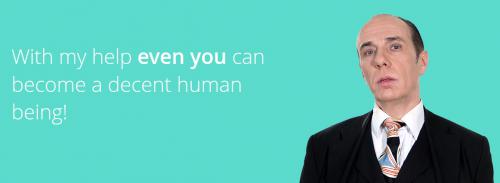 Welcome to the Zero Trollerance six-step self-help program!
Welcome to the Zero Trollerance six-step self-help program!
Hate has always been a part of the internet and the intentional harassment of other people (termed trolling) has too. But the gendered forms of harassment and violence on Twitter today point to a deeper problem in society that cannot be solved by technical solutions alone. Trolls need serious, practical help to overcome their sexism, deal with their anger issues and change their behaviour.
Zero Trollerance is a self-help journey designed by guru Adler King in consultation with reformed trolls. Adler’s team of Troll Coaches are constantly analysing Twitter and enrolling new trolls in the program where they are led through an intensive process of self excavation and given practical tools to overcome their inner hurdles. For trolls, this is the first step towards a new life.
Overcoming denial is the first stage in any therapeutic process. The subject has to confront oneself and dismantle the arguments that they have built up over time to justify their behaviour. These arguments can be rational or completely fantastical, dreamed up by one’s deeply buried guilt reflex. The justifying arguments can in some cases, such as the troll, become a motivational force, pushing the subject deeper and deeper into harmful behaviour.
A successful life hinges on the creation of balance. The increasing dependence on digital means of interacting with the world is a concern for mental health specialists across the board. In this growing field of research, experts question the impact of excessive social media activity on a user’s well-being as well as the effects on society at large. If the large majority of one’s interactions are digitally mediated, it becomes very easy to disassociate from one’s rationality, emotions and often one’s own physical needs. Establishing a healthy relationship with the body is a key step in the troll’s recovery process. Disconnecting from the digital world and reconnecting with oneself is a crucial moment for the troll to examine his unhealthy dependence and his associated behavior.
Anger is not always an unhealthy emotion. It can be a positive force which can motivate people to stand up for what they believe in. But if it is not managed correctly, it can be very destructive. Angry people tend to act before they think and this leads to regrettable consequences. While some people learn to deal with anger by repressing it, we advocate for learning to express it in non-harmful ways. This does not mean that the power of the emotion has to be lost, it can be channeled in other directions. Imagine for example if the collective energy of trolls’ anger could be used to fight for a utilitarian goal?
By step four the troll should have recognized that his behavior is illegitimate. That his reactions to the triggers he experiences online are usually disproportionate to the wrong-doing he perceives. That the arguments he uses to justify his behavior are groundless. At this point, he can start to look at his attitude towards other genders with fresh eyes and probe for the real root of his bigotry. Whether it is located in pure ignorance or a fossilized defense mechanism, he can start to unpack and understand his reflexes. And from there, changing his behavior will no longer seem like such an insurmountable task.
Kindness, humility and generosity are not necessarily innate human characteristics. They do however carry great social value so it really is in everyone’s interests to learn them. Learning how to behave decently and observe social codes will help trolls to leave behind their stained past and establish a new identity. It will also help others to like them.
Letting go of an identity is never easy. This final steps brings the troll to a point of no return. Even if he relapses at a later point in time, which is highly likely, he cannot undo the process he has been through. He will forever be a troll but whether he continues to indulge in sexist behavior is completely in his own hands. His task now is to move forward, continue to challenge himself and take others with him as he goes.